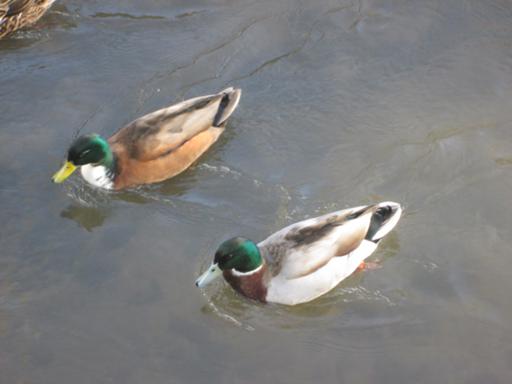A typical mallard drake has a yellow bill and white or grey flanks. Not
so on the Loudwater.
(All right, it's not technically the Loudwater; it's the River
Wye. No, not that one. Not
that one
either. It's
our local river
that flows from Bradenham in the Chilterns down to the Thames above
Cookham Lock, and gives Wycombe its name.)
Anyway, a couple of days ago I was crossing the Wye on the way to the
post office (since the closer pillar box doesn't get a collection
after 9am, yes, 9am), and stopped as I usually do to look at the
ducks. And they looked a bit odd. (As usual, click for full size, and
cc-by-sa.)

The one at the top has a fairly normal bill colour, but strange brown
plumage and a white front. The one at the bottom has normal mallard
plumage, but an oddly blue-grey bill.
What are they up to under that bridge? Wikipedia says "Due to the
malleability of the mallard's genetic code, which gives it its vast
interbreeding capability, mutations in the genes that decide plumage
colour are very common and have resulted in a wide variety of
hybrids". I've seen Muscovies down there, but nothing like these before.
- Posted by Michael Cule at
11:53am on
26 February 2015
Well, the Wye used to be heavily polluted with the run-off from the paper mills (now all redeveloped into shopping malls and housing developments) so who knows what strange mutant waterfowl lurk...
I had an acquaintance who claimed he'd once had the job of trapping ducks from the Wye and taking them to be autopsied as part of a project to monitor pollution levels. "Coo, you wouldn't want to eat one of them, Michael!"
Also, I'm not sure if the river named the town or vice versa.
- Posted by RogerBW at
11:57am on
26 February 2015
My assumption is that Wycombe = Wye (that river) + Combe (a valley), i.e. the valley of the Wye.
I have no particular plans to eat the Wye ducks. Honest.
- Posted by Chris at
01:09pm on
26 February 2015
Some of the ducks must be absolutely horrified by the goings-on under that bridge. Rather than swim under it, they laboriously climb the bank (not easy just there, because it is steep) and then try to cross the road. More than once I have had to stop the car and shepherd a duck or two back into the water, whilst white van drivers fume, hoot and in an extreme case overtook my empty car straight at the car that was also waiting for the duck to cross, nearly running the duck over. (It flew away at that point and Lord knows where it ended up: maybe it was one of the ones that were asleep on our roof one morning.)
The swan that was standing furiously in the middle of that bit of road simply stopped the traffic, including a bus, until it condescended to descend; nobody wanted to mess with it, because it was clearly in a filthy temper, possibly about what was going on under that bridge.
Incidentally, Wikipedia is wrong: it's not malleability, say the ducks, it's a mallardability.
- Posted by Michael Cule at
02:20pm on
26 February 2015
According to my copy of THE CONCISE OXFORD DICTIONARY OF ENGLISH PLACE-NAMES (and there's academic/bibliophilic name-dropping for you) the name derives from the OE elements WIC and HAMM meaning 'dwellings near a meadow'.
The river name Wye (which just means 'river' in other parts of the country) it declares 'a late back formation'. So there.
- Posted by RogerBW at
02:34pm on
26 February 2015
Ooh, thanks!
(That is not ironic. I love to know stuff like this.)
- Posted by Owen Smith at
11:15pm on
26 February 2015
Meanwhile on the Cam for a few years we had Mr. Asbo the male swan who was so vicious several people ended up in hospital. Eventually he was forcibly relocated, to much anger from a section of the community who think no-one except the wildlife has any business using the river or its towpaths.
- Posted by RogerBW at
09:26am on
27 February 2015
Some geese in Ware had worked out that their patch of the Lee Navigation was between the supermarket and one of the housing areas. So one goose would sit on the towpath and look cute. (I know it's a stretch, but they'd had plenty of practice.) People would stop to look at it, and half the flock would quietly get out of the water onto the towpath behind them, and one of them would honk menacingly. When they looked round, the other half would get out onto the towpath ahead of them. No passage without bread.
- Posted by Owen Smith at
01:49pm on
27 February 2015
And yet bread is quite a bad food for water fowl, it does their digestive systems no good at all.
Comments on this post are now closed. If you have particular grounds for adding a late comment, comment on a more recent post quoting the URL of this one.